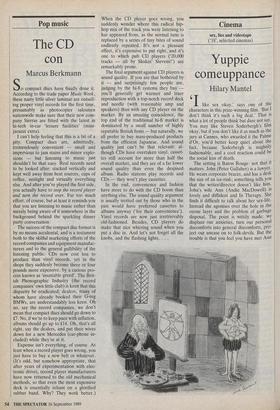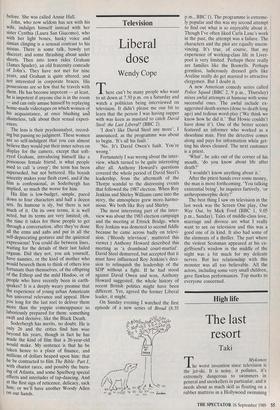Cinema
sex, lies and videotape ('18', selected cinemas)
Yuppie comeuppance
Hilary Mantel
like sex okay,' says one of the characters in this prize-winning film. 'But.1 don't think it's such a big deal.' That is what a lot of people think but dare not say. You may like Steven Soderbergh's film okay, but if you don't like it as much as the jury at Cannes, who awarded it the Palme d'Or, you'd better keep quiet about the fact, because Soderbergh is mightily fashionable, and a cool reaction could be the social kiss of death.
The setting is Baton Rouge: not that it matters. John (Peter Gallaher) is a lawyer. He wears corporate braces, and has a desk the size of an ice-rink; something tells you that the writer/director doesn't like him. John's wife Ann (Andie MacDowell) is lovely and diffident and In Therapy. She finds it difficult to talk about her sex-life. Instead she agonises over the hole in the ozone layer and the problem of garbage disposal. The point is wittily made: we displace our anxieties, turn our personal discomforts into general discomforts, pro- ject our unease on to folk-devils. But the trouble is that you feel you have met Ann before. She was called Annie Hall.
• John, who now seldom has sex with his Wife, indulges himself instead with her sister Cynthia (Laura San Giacomo), who With her light bones, husky voice and simian clinging is a sensual contrast to his missus. There is some talk, bawdy yet discreet; and some thrashing about under sheets. Then into town rides Graham (James Spader), an old fraternity comrade of John's. They have not met for nine years, and Graham is quite altered, and not interested in corporate braces. His Possessions are so few that he travels with them. He has become impotent — at least, he is impotent if anyone else is in the room — and can only amuse himself by replaying home-made videotapes on which women of his acquaintance, at once blushing ana shameless, talk about their sexual experi- ences.
The lens is their psychoanalyst, record- ing but passing no judgment. These women are so self-indulgent that you can almost believe they would put their inner selves on display for the camera, except that soft- eyed Graham, introducing himself like a Poisonous female friend, is what people used to call 'a creep'; the term has been superseded, but not bettered. His boyish sincerity makes your flesh crawl, and if the film is confessional, as Soderbergh has implied, so much the worse for him.
His film is low-budget, simple, pared down to four characters and half a dozen sets. Its humour is sly, but there is not much of it. On its own terms, it is well acted, but its terms are very limited; oh, the time it takes for these people to get through a conversation, after they've done all the erms and aahs and put in all the self-deprecating gestures and the quizzical expressions! You could die between lines, waiting for the details of their last failed Orgasm. Did they not, you ask yourself, have nannies, or the kind of mother who would beseech them to think of others less fortunate than themselves, of the offspring of the Ethiop and the mild Hindoo, or of People who have recently been in earth- quakes? It is a deeply weary premise that the experience of young urban Americans has universal relevance and appeal. How You long for the last reel to deliver them more than the yuppie comeuppance so laboriously prepared for them: something swift and decisive, like the Black Death.
Soderbergh has merits, no doubt. He is Only 26 and the critics find him wise beyond his years, though in fact he has made the kind of film that a 26-year-old would make. My sentence is that he be taken hence to a place of finance, and millions of dollars heaped upon him: that he be contracted to film The Bible: Part I, With chariot races, and possibly the burn- ing of Atlanta, and some Spielberg special effects and interludes of tap-dancing. And at the first sign of reticence, delicacy, sack him; or we'll have another Woody Allen On our hands.



































































 Previous page
Previous page